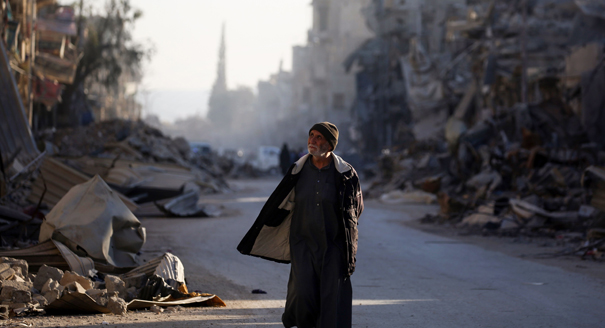As Iran defends its interests in the region and its regime’s survival, it may push Hezbollah into the abyss.
Michael Young
{
"authors": [
"Ghida Tayara"
],
"type": "commentary",
"blog": "Diwan",
"centerAffiliationAll": "dc",
"centers": [
"Carnegie Endowment for International Peace",
"Malcolm H. Kerr Carnegie Middle East Center"
],
"collections": [
"Three Question Time",
"Political Islam"
],
"englishNewsletterAll": "menaTransitions",
"nonEnglishNewsletterAll": "",
"primaryCenter": "Malcolm H. Kerr Carnegie Middle East Center",
"programAffiliation": "MEP",
"programs": [
"Middle East"
],
"projects": [],
"regions": [
"Levant",
"Syria",
"Middle East"
],
"topics": [
"Political Reform"
]
}
Source: Getty
Steven Heydemann discusses postwar reconstruction in Syria, and how it might affect the future of the Assad regime.
Steven Heydemann is the Janet Wright Ketcham 1953 professor in Middle East Studies at Smith College in Northampton, Massachusetts, and a nonresident senior fellow in the Center for Middle East Policy of the Brookings Institution. From 2011 to 2015 Heydemann directed the Syria program at the United States Institute for Peace, and during that time he participated in the preparation of a report titled “The Day After: Supporting a Democratic Transition in Syria,” which was widely used by activists, non-governmental organizations, and governments during the early phases of the Syrian conflict, and was endorsed by numerous Syrian opposition groups as well as the European Parliament. Diwan caught up with Heydemann in early February, during his visit to Beirut to participate in a Carnegie roundtable on post-conflict reconstruction, to get his views about an eventual reconstruction process in Syria.
Ghida Tayara
Senior Digital and Web Coordinator
Carnegie does not take institutional positions on public policy issues; the views represented herein are those of the author(s) and do not necessarily reflect the views of Carnegie, its staff, or its trustees.
As Iran defends its interests in the region and its regime’s survival, it may push Hezbollah into the abyss.

Michael Young
A recent offensive by Damascus and the Kurds’ abandonment by Arab allies have left a sense of betrayal.
Wladimir van Wilgenburg
The government’s gains in the northwest will have an echo nationally, but will they alter Israeli calculations?

Armenak Tokmajyan
Beirut and Baghdad are both watching how the other seeks to give the state a monopoly of weapons.
Hasan Hamra
The country’s leadership is increasingly uneasy about multiple challenges from the Levant to the South Caucasus.

Armenak Tokmajyan